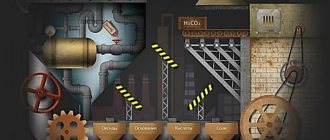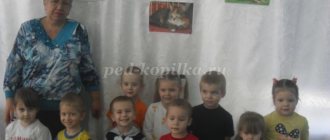MADOOU general developmental kindergarten No. 422 “Lorik”, Yekaterinburg
Parents are recommended:
- talk with your child about what time of year it is, what changes have occurred in living and inanimate nature in the spring;
- remember the names of the spring months, signs of spring;
- observe changes in nature while walking together in the park;
- remember how forest animals and birds behave in the spring, what changes occur in trees and shrubs, meadow and garden plants, in people’s clothing;
- remember the topic “Migratory Birds”;
- tell your child about spring field work.
On the topic children should know:
- the first signs of spring in nature,
- what happened to the snow, how the rivers changed in spring, the length of day and night,
- what trees and grass look like in spring,
- how animals and birds welcome spring,
- what people do in spring, how clothes change,
- know the names of the spring months.
Materials for familiarization with the topic:
Enjoy the beautiful video and beautiful spring music: https://cloud.mail.ru/public/86zK/3fAoNQHfV
We see all the signs of spring in the presentations: https://cloud.mail.ru/public/2FsE/2TkCSzyFS https://cloud.mail.ru/public/3EWE/4ukN8CBmK
Speech development tasks:
- “Pick up a word” : what is the sun like in spring? – warm, radiant, light, bright... What does the sun do in spring? – warms, bakes, caresses, shines, warms...
- Match objects to signs, what happens?
spring – ………., spring – ……….., spring – …………., spring – ……….. Words for reference: day, weather, mood, sun, months, grass, sky, forest, rain, thunderstorm, flowers.
- “Call me kindly”:
Cloud – cloud, ray – …………., ice floe – …………., puddle – ………….., thawed area – ……….., sun – …………..
- Count: one stream, two streams…. Five streams, one shiny icicle, two shiny icicles... five shiny icicles.
- Say it the other way around:
In winter the snow is clean, and in spring…… In winter the days are cold, and in spring……. In winter the sun is dim, and in spring…….. In winter the weather is often cloudy, and in spring…….
- Look at the picture and tell me where the spring rays reached?
- Write a descriptive story about spring using the scheme for describing the seasons.
- Consider a series of plot paintings, think about what comes first and what comes next.
Read the story “The Starlings Have Arrived”: One winter, during a labor lesson, the teacher suggested that the schoolchildren make birdhouses for the starlings. The labor teacher explained to them that this requires tools, boards, nails and patience. The children set to work together. When the birdhouses were ready, the children and their teacher hung them on trees in the park. In the spring, schoolchildren enjoyed watching starlings.
Based on the pictograms (pictures - tips), remember and retell the story.
- Remember the names of migratory birds. Why are these birds called that? Why are they forced to fly away? When do they fly away and return to our region?
LiveInternetLiveInternet
Quote from Tatyana57
Read in full In your quotation book or community!
SPEECH DEVELOPMENT. LEXICAL TOPIC “EARLY SPRING”.
CHILDREN SHOULD KNOW THE NOUNS: spring, March, April, May, snow, icicles, thawed patches, sun, streams, messengers of spring, flood, ice drift, drops, flood, puddles, moisture, crops, planting, awakening, snowdrop, thaw. ADJECTIVES: cold, murmuring, sonorous, talkative, violent, noisy, full of water, spring, radiant, warm, bright, welcoming, red, wet, March, spring waters, azure, clean, clear, bird-like, cool, sunny, loose, harsh . VERBS: has arrived, is advancing, has arrived, has flown out, is circling, curling, fussing, howling, murmuring, running, ringing, flooding, moving, singing, breaking through, melting, shining, warming, warming, dripping, flowing, breathing, smelling, waking up, settle. CHILDREN SHOULD BE ABLE TO SELECT OBJECTS TO ACTIONS: Spring has arrived Swimming - ... Blowing - ... Running - ... SELECT ACTIONS TO OBJECTS: The sun - warms, shines ... Clouds - ... Snow - ... SELECT SIGNS AND VICE VERSE: The earth is black, cold, frozen ... Sun - ... Birds - ... Clean, fast, sonorous - stream Bright, radiant, warm - ... SELECT COMPARISONS: Blue ice looks like (glass ...) Thick fog - ... Fluffy clouds - ... Icicle - ... MAKE SENTENCES WITH THE CONJUNCTION “BECAUSE” : Why does the snow melt? The snow is melting because... Why do streams run?...
Dear parents! Invite your child to answer the questions: What time of year do we spend? (We are saying goodbye to winter.) What time of year begins? (Spring begins.) Introduce your child to the signs of early spring: in the spring nature wakes up; the sun is shining brightly and starting to warm up; The snow melts, streams run, thawed patches appear; icicles appeared on the roofs; the days are getting longer and the nights are getting shorter; the buds on the trees swelled and the leaves hatched; the first grass appeared; snowdrops bloomed; the sparrows chirped cheerfully, the first migratory birds from hot countries will soon arrive; insects woke up; wild animals have risen from hibernation; people took off their warm winter clothes. Read a poem about early spring, memorize it: Drops jump loudly from the roof, Icicles cry above the window. The drops are jumping into my palm, and onto my grandmother’s cat, onto the steps, onto the railing. The cat even opened her mouth. Drops jump loudly from the roof. Spring is coming to us. We hear: Cap! Cap! Cap! Cap! REtelling of the text. MELT WATER. Spring came. The sun is warming. The snow is melting and streams are flowing. There is a lot of water around. Children are happy - they can float boats on the water, splash through puddles in rubber boots. The trees rejoice - they will drink the melt water and will turn green and bloom. The rooks rejoice - there are many worms in the wet soil in the fields. The rooks are full. The sparrows are happy - they drink water, swim in puddles and chirp loudly: “Spring has come!” * ANSWER THE QUESTIONS: - After what time of year does spring come? - What does the sun do? — What happens to the snow? - Who needs melt water? -What are children happy about? — Why do trees need water? - Why are the rooks happy? - Why do rooks need worms? -Who swims in puddles?
SPRING. TEXT FOR RETELLING. Spring is coming. The snow is melting, drops are ringing. In spring the sun shines brightly. The ice is breaking on the river. The buds burst on the trees and fragrant leaves appear. Snowdrops are blooming in the forest. Children hang birdhouses on trees and launch boats. Insects wake up, birds build nests. Spring came! LET'S GUESS RIDDLES ABOUT SPRING: Loose snow melts in the sun, The wind plays in the branches, Birds' voices are louder. So, it has come to us... (Spring) She comes with affection and with her fairy tale. He will wave his magic wand and the snowdrop will bloom in the forest. (Spring) The beauty walks, touches the ground lightly, walks to the field, to the river, and over the snow and over the flower. (Spring) The snowball is melting, the meadow has come to life. The day is coming. When does this happen? (Spring) I open the buds into green leaves. I dress the trees, I water the crops, there is a lot of movement, My name is... (Spring) The snow is turning black in the clearing, The weather is getting warmer every day. Time to put the sled in the closet. What a time of year it is. (Spring) Green-eyed, cheerful, beautiful maiden. She brought us a gift, Something that everyone will like: Greenery for the leaves, Warmth for us, Magic for everything to bloom. Birds flew after her. All the craftswomen sang songs. Can you guess who she is? This girl is... (Spring) Near the snow-covered hummocks, Under a white snow cap, We found a small flower, Half-frozen, barely alive. (Snowdrop) He was the first to emerge from the soil in the thawed patch. He is not afraid of frost, even though he is small. (Snowdrop) In a blue shirt Runs along the bottom of the ravine. (Stream) Not a pedestrian, but walking. People at the gates are getting wet. The janitor catches him in a tub. A very difficult riddle? (Rain) White peas On a green stem. (Lily of the valley) With an inaudible rustle of petals, snow-white pearls blossomed, like a fresh, delicate tiny flower, rushing from under the snow towards the sun. (Snowdrop) Yellow, fluffy, fragrant balls. He will shelter them from the frost in his branches... (Mimosa) He is the Flower Prince-Poet, wearing a yellow hat. An encore sonnet about spring He will read to us... (Narcissus) You will find them in Holland, They are held in high esteem everywhere there. Like bright glasses, they bloom in the parks... (Tulips) A warm southern wind is blowing, the sun is shining brighter. The snow is thinning, softening, melting, the loud rook is flying in. What month? Who will know? (March) The streams are running faster, the sun is shining warmer. Sparrow is happy with the weather The month came to visit us... (March) In warm sunny boots, With a light on the clasps, A boy is running through the snow The snow is scary, the naughty one: As soon as he steps, the snow has melted, The ice on the rivers has broken. He was overcome with excitement. And this boy - ... (March) The river roars furiously And breaks the ice. The starling returned to his house, and the bear woke up in the forest. A lark trills in the sky. Who came to us? (April) The bear crawled out of the den, There was mud and puddles on the road, A lark trilled in the sky. He came to visit us... (April) There was frost at night, There were drops in the morning, So it was outside... (April) The forest, fields and mountains, all meadows and gardens. He knocks on every hole and hums near the water. “Wake up! Wake up! Sing, laugh, smile!” A pipe can be heard far away. This wakes everyone up... (April) The distance of the fields turns green, The nightingale begins to sing. The garden is dressed in white, The bees are the first to fly. Thunder rumbles. Guess what month this is? (May) The garden tried on white, The nightingale sings a sonnet, Our land is dressed in greenery We are greeted with warmth... (May) A baby is running in bast shoes, You can hear his steps. He runs and everything blooms, He laughs and everything sings. I hid happiness in the petals of the lilac bushes. “My lily of the valley, smell sweet!” The cheerful one commanded... (May) Housewarming at the starling's He rejoices endlessly. So that a mockingbird could live with us, We made it... (Birdhouse) Here on a branch is someone’s house. There are no doors or windows in it, But it’s warm for the chicks to live there. This is the name of the house... (Nest) A ball grew on a green fragile leg by the path. The breeze rustled and scattered this ball. (Dandelion) In the midst of Spring, juice drips from the snow-white bark. (Birch) The streams are running faster, the sun is shining warmer, Sparrow is happy about the weather - The month came to visit us... (March). The bear crawled out of the den, Mud and puddles on the road, A lark trilled in the sky - He came to visit us... (April). The garden tried on white, the Nightingale sings a sonnet, our land is dressed in greenery - We are greeted with warmth... (May). The starling's housewarming party - He rejoices endlessly. So that a mockingbird could live with us, we made... (birdhouse). The snowball is melting, the meadow has come to life, the day is coming. When does this happen? (In spring) An ice bag hangs outside the window, It is full of drops and smells of spring. (Icicle) I run to Mother River and cannot remain silent. I am her own son, and I was born in the spring. (Stream) The first to emerge from the ground in a thawed patch. He is not afraid of frost, even though he is small. (Snowdrop) Black, agile, shouts: “Krak!” Worms are the enemy. (Rook) The house was built for the singer. Without windows, without a porch. (Birdhouse) Link to website: https://ejka.ru/blog/zagadki
APRIL. April, April! Drops are ringing in the yard. Streams run through the fields, puddles on the roads. The ants will soon emerge from the winter cold. A bear makes its way through the dead wood. The birds began to sing songs and the snowdrop blossomed.
Homework for children with special needs on the topic “Spring”
Topic: “Spring. Signs of spring. Animals and plants in spring. Adult labor"
1. What time of year is it? (spring has come). What spring months do you know? Name the current one. (March April May). Tell us what changes in nature have occurred in the spring (signs of spring - the sun shines more often and brighter, the snow is melting, streams are running, thawed patches appear on the ground, drops are ringing, the sky has become blue, white clouds are floating across it, birds are returning from warm countries, animals are waking up from hibernation, change their coats, prepare for the birth of their cubs. Soon the buds will swell on the trees, the first spring flowers will appear on the ground - snowdrops and mother and stepmother, the grass will turn green)
2. Tell us what people do in the spring in the fields, gardens and vegetable gardens. What tools do people use to work in gardens and vegetable gardens? (digging the ground, preparing beds for planting, fertilizing the soil, replanting seedlings, planting flowers and trees, whitening tree trunks to protect them from insects, preparing fields for sowing wheat, etc. tools: shovel, rake, watering can, saw , brush)
3. “Call it affectionately”: garden – garden, vegetable garden – ………, garden bed – ……, apple tree – ……, sun – ……., stream – ………, puddle – ……., tree – ……… ., thawed area – …….. 4. Say the opposite: warm – cold, damp – …… (dry), dirty – ………, cloudy – ………, light – ……., day – …….., morning - ………., rainy - …….
5. Choose as many words as possible: • SPRING – day, rain, thunder, flower, etc. • SPRING – drops, thunderstorm,…………. • SPRING – flowers, days, ……. 6. Correct the sentences: • THE SUN IS SHINING BECAUSE IT HAS GOT WARM. 7. Remember and name who has cub and chick: For a bear - ……….. For a badger - ……….. For a fox - ……………. For a she-wolf - ………….. For a hare - …………… For a hedgehog - ……………. For the starling - ………….. For the magpie - …………… For the rook - ……………..
Topic: “First spring flowers”
1. Listen carefully, repeat from memory: SNOWDROP, DANDELION, MOTHER - AND - STEPMOTHER. Tell me in one word what it is. (Flowers). These flowers appear in the spring, which means they are the FIRST SPRING FLOWERS. Determine the number of syllables in the words: FLOWER, SNOWDROP, DANDELION.
2. Remember and tell what parts a flower has and what they are needed for. (Root, stem, leaves, buds, flowers)
3. Choose 3 words - definitions for these words:
• Dandelion (which one?) – yellow, tall, beautiful • Snowdrop (which one?) – tender, fragrant, …….. • Mother – and – stepmother (which one?) – fragrant, ……………..
4. Answer using the following example:
• 1 snowdrop – 2 snowdrops – 5 snowdrops • 1 dandelion – ……………………………………………………….. • 1 flower – ……………………………………………………… …. • 1 stalk – …………………………………………. • 1 leaf – ……………………………………………………………
5. Listen to the text, answer the questions at the end of the text in complete sentences. Retell the text yourself.
Snowdrops.
Snowdrops bloom along the edges of forests and in sunny meadows in early spring. The snow has not yet melted in the deep ravines. And under the trees they bloom, flowers spread out in a white and blue carpet. These are snowdrops - the first spring flowers of our forest.
• What did you learn from the story about snowdrops? When do they bloom? Where do they grow? What color are they? • What other spring flowers do you know?
The very first, the most subtle There is a flower with the name tender. Like a ringing drop of hello, It’s called...
See KIESOplast97 information on the website.
Topic: “Early spring. Signs of spring, plants and animals in spring"
1. What time of year is it outside? Explain why you think so. Name the first month of spring, the second, the third. What month is it now? What happened before it, what will happen after it?
2. Find the common word: • It pours, murmurs – ……….. • Blows, makes noise – …………… • Warms, shines – …………..
3. Count to 5, correctly coordinating the words: little snowdrop, ringing brook
4. Come up with 3 words - definitions: • Spring (what?) - early, warm, sunny. • Sky in spring - ………………………………. • Weather in spring - ……………………………. • Snow in spring - ……………………………….
5. Remember and name migratory birds. (at least 3). Explain why they are called migratory.
6. Who has whom? For a bear – ………….., for a fox – ….., for a hare – …….., for a badger – …….., for a hedgehog – ……., for a she-wolf – ………….
7. Write your own story about early spring. (5 - 6 sentences)
Author of the material: Kravchuk Irina Anatolyevna
Lesson on the topic: Spring in the preparatory group
Children’s mastery of basic logical techniques on the topic “Spring”
Working with children with general speech underdevelopment, she summarized methodological developments on the problem “Development of logical thinking in preschoolers with general speech underdevelopment.”
The developments were presented with systematized lexical and illustrative material on all lexical topics, which was intended for work with children by both speech therapists and educators. I conducted this lesson with children (7 years old) who attended my “Entertaining Logic” club. She remade the Russian folk tale “How Spring Overcame Winter”; she developed and decorated the presented games with painting material herself. Goal : children master basic logical techniques: inference, systematization, limitation. Objectives: - enrich and activate the vocabulary on the topic “Spring”;
— consolidate productive and motor activity; - develop the ability to reveal causal connections between phenomena of the surrounding reality; isolate objects from many different objects according to a characteristic common feature, quality, property; develop skills of consistent actions. CONDUCT PLAN
Teacher: “Guys, I know that you all love listening to fairy tales. And today I will tell you a new fairy tale. Sit back and listen carefully. The fairy tale “How Spring overcame Winter” Once upon a time, Mashenka lived in a village. One early spring morning she sat by the window and thought about spring. Masha is waiting for a warm, kind Spring, but she is neither seen nor heard. Winter is not going to leave, frosts are forging everything. Everyone is tired of it, cold and icy. What to do here? Trouble! Masha decided to go look for Spring. I got ready and went. She came to the field and called the Sun: Sun, Sun, Golden Bucket, Look out from behind the mountain, Light up everything in the area! The Sun peeked out from behind the mountain, Masha and asked: “Have you seen the red Spring, Sun?” The sun says: “I saw it and I’ll tell you where to look for Spring, just complete my task first, then I’ll tell you.” Teacher: - Children, Mashenka can’t cope alone. Let's help her? I will begin the phrase, and you will finish it with the words that are necessary in meaning. D/i “Finish the phrase” - inference. Teacher: - Well done guys, they helped Mashenka. Now listen to what happened next. The sun says: “And now, Mashenka, go further, when you see a green forest in front of you, look for Spring there.” Yes, call her to your lands. — Masha went to look for Vesna. How long did it take Mashenka to walk? Suddenly a green forest appeared before her. Masha walked and walked through the forest, completely lost. She had just sat down on a stump to rest when she saw that the dead tree had begun to move. From his winter sleep, Father Bear woke up. And he appeared in front of Mashenka. - Hello, girl, why did you come to me in the forest? - I, Father Bear, am looking for the red spring. I want to invite her to our region. - Okay, Mashenka, I will help you, but you will also serve me a faithful service: - Place the chips in empty cells so that they are not identical to each other. D/i “Fill in the empty cells” - systematization. Well done boys! And our fairy tale continues. The bear thanked Mashenka and gave her a magic ball. “Wherever he goes,” says the bear, go there too. How long did Mashenka walk for a short time, she was completely tired, she just wanted to rest... As she sees, the beautiful swan is flying: she releases silk grass across the meadows, spreads pearl dew, merges small streams into fast rivers. That swan was Spring. Here Masha began to call Vesna: “Oh, Spring-Spring, good mother!” You go to our lands, drive away the fierce Winter. Teacher: - Let us, together with Masha, call for the Red Spring. Speech with the “Vesnyanka” movement Teacher: “Vesna Mashin heard a voice and said: Fulfill my request, then I will come to your region and drive away the fierce winter.” — Cover the “extra” picture with a chip. Close what never happens in spring. D/i “The fourth wheel” is a limitation. Red Spring took the golden keys and went to close the fierce Winter. Winter got scared, ran far, far over the high mountains, and hid in icy holes. There Spring locked it with golden keys. That's it - Spring has overcome Winter! Masha returned to her native land, and Spring had already visited there. She spread silk grass and dressed the trees in green dresses. This is where the tale ends, and well done to those who listened! Bottom line. Children, did you like the fairy tale? And I liked how you helped Mashenka today. She would never be able to cope without you. Well done!
We recommend watching:
Synopsis of educational activities for children of the preparatory group on the topic: Spring Synopsis of an integrated lesson in the preparatory group on the topic: Spring Synopsis of educational activities in the preparatory group on the topic: Primroses Synopsis of an integrated lesson on speech development and artistic creativity on the topic: Spring in the
Similar articles:
Educational spring quiz with answers for children 6-7 years old
Spring games for children in kindergarten. Senior preparatory group
Spring fairy tale. Scenario for the preparatory group
Spring fun for older preschoolers. Scenario
Musical entertainment on the theme “Spring” in the preparatory group of a preschool educational institution. Scenario







